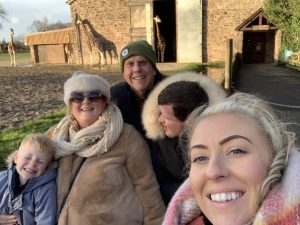My Life Blog – Caroline Tomlinson: ‘Why it takes a whole community to be part of the Health and Social Care workforce’
Posted on Tuesday, March 9th, 2021
 I think the events of the past year have made everyone at some point stop and consider not only what they want out of life but what positive effects they can have on someone else’s too. Whether that be changing career to one that makes a difference, or helping a shielding neighbour with their shopping, we’ve all in some way had cause to find meaning in what we do every day.
I think the events of the past year have made everyone at some point stop and consider not only what they want out of life but what positive effects they can have on someone else’s too. Whether that be changing career to one that makes a difference, or helping a shielding neighbour with their shopping, we’ve all in some way had cause to find meaning in what we do every day.
Which is where working in the care sector comes in. Traditionally, of course, it’s bound up with looking after people who need care. It’s hard – if hugely rewarding – work. But what I’ve been saying a lot recently to people who are considering more meaningful work is that the job isn’t always about the practical act of caring. It’s about helping people to live a good life in all sorts of ways, and that means attracting people with all kinds of skills and gifts that can enhance the quality of other people’s lives.
And across My Life, nearly 80 percent of the people doing incredible work with and for the people we serve have never worked in the sector before. We’re finding a whole new group of people who want to work across health, education and care. And who stay with us far longer than the industry average.
How we do it isn’t a trade secret – I’ve not quite written the book about recruitment in the care sector (yet!) but at My Life we did pioneer the approach and I do run the course. It’s called Pathways To Employment – and while we started it in Wigan, we’ve coached people in communities across the country to deliver it too.
The idea is to have a dialogue with people about the values of an organisation and what it stands for, before they decide to apply for a job. Our strapline for Pathways to Employment is ‘finding people with big hearts,’ and it began in 2012 when I realised that there were people employing their own staff – through a direct payment or personal health budget – but struggling to find really good people to provide their care. All they could do was put a job advert on Indeed and hope for the best. Sometimes it worked, sometimes it didn’t.
And the single biggest issue in our sector is recruiting really good people, not least because pay has been so low in the past that they just jump to another job offering slightly more money. So my view was that we needed to reshape the whole system, and bring in lots of people with lots of skills and gifts. As long as they’ve got the right attitude to do the job, you can train them in the specifics of the role.
But first of all, I felt it was really critical to give people insight into the variety of jobs available. A lot of people who come on the course wouldn’t directly apply for a role on Indeed because they wouldn’t consider themselves qualified enough. What we do with Pathways to Employment is work with people before that point of recruitment to discuss whether there is something that’s right for them.
It’s attracted such a vast array of people from masses of different backgrounds. We get people from hospitality who make brilliant personal assistants as they’ve been schooled in customer care. We’ve appointed teachers, nurses and social workers to work across My Life utilising their skills and delivering personalised support across health, education and social care; Amy, for example, used to work for a bank dealing with bereaved families – though she was talking with people who needed emotional as well as practical support, she felt “unable to speak to people like a real human.”
She heard about Pathways to Employment, completed the course and was “hooked”. She started out volunteering at our café and it wasn’t long before it was obvious how much she was enjoying it – and now she works full time in support for My Life. I spoke to her the other day and she still has the great energy which has been her best asset. “I thoroughly love my job,” she said. Does it get any better than that?
Our safeguarding lead, too, is a former police inspector who wasn’t ready to retire and had masses of life experience and transferable skills. He came through Pathways To Employment and has been a big asset to My Life.
What his experience proved is that the pathways into employment at My Life aren’t always directed towards being a frontline carer – organisations like ourselves need a whole range of skill sets to fit a wide range of roles. And actually, although the Pathways to Employment course is crucial, the process of finding the right colleagues starts a long way before that. We can’t expect people just to turn up out of the blue – we have to get out in the community, market ourselves on social media and capture the imaginations of people who have always thought about a career change or giving something back but didn’t know where to start.
I think of Nicky, who works within our My Life Learning team at Standish. She’d worked in mainstream education for years but had got frustrated with the lack of opportunity to work on individual needs. She heard about Pathways To Employment and within hours of attending the first session instantly knew she wanted to be part of the journey. “In a way I felt like I already belonged,” she remembers. I just want to share with you here what she told me recently:
“Although at the time I didn’t understand why My Life employed staff in this way, by the end of the course I totally did. The discussions which took place emphasised My Life’s ethos and the values that make it the place that it is; being the right person mattered most, not the qualifications you had. The way in which children, young people and adults alike were being supported by a hand up, not a handout, really appealed to me. Despite not working with young adults before, I desperately wanted to become part of the team and to make a difference within a community where everyone belongs.”
That’s why the course is free, usually at the weekends and is designed to give people some empowerment and self-confidence. So even if people don’t decide to take the relationship with us further – quite a low number in reality – they have still participated in something worthwhile which has opened their minds to different things.
It was reassuring to me that Nicky talked about community. One of the biggest drivers for me is that we employ people who both believe in their community and are connected to it, because invariably that means they open up new worlds for the often isolated and lonely people they care for. I truly believe that a big part of the caring role is to help people gain wider networks and connections.
And some of those connections come at the course itself. I bring in people looking for personal assistants, and the participants get to chat to them informally. It’s fascinating to watch the people on the course working out whether that kind of job – working for a family who need care – is for them, or whether in fact that specific family would work for them. And then – a bit like The X Factor! – sometimes we might actually match people that have met at the course who then go on to have really successful working relationships.
So Pathways To Employment is unique – and yet has become transferrable across the country. It’s not a course on how to deliver care. It’s a course that explores how to deliver really good quality support for people, and where you might fit within that. It might be that your “fit” is a day a week in combination with other work, which is also fine. What the course really tells you is that there are so many opportunities for meaningful work out there.
Caroline Tomlinson, My Life Founder and Chief Executive Officer
Our next Pathways to Employment course will take place in Wigan in June 2021. Please contact us on 01257 472 900, or email info@my-life.org.uk for more details.
Subscribe to My Life’s Blog
Like what you’ve read? Subscribe here and receive our blog direct to your inbox!
Tell us what you think
Please leave a comment below.










Leave a Reply